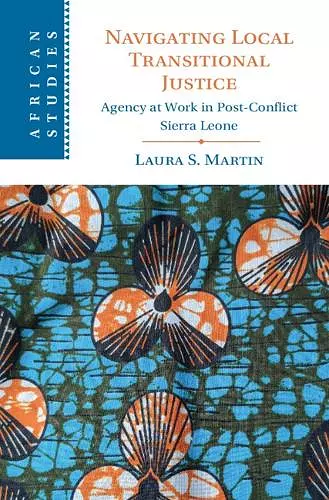Navigating Local Transitional Justice
Agency at Work in Post-Conflict Sierra Leone
Format:Hardback
Publisher:Cambridge University Press
Published:11th May '23
Currently unavailable, and unfortunately no date known when it will be back
This hardback is available in another edition too:
- Paperback£29.99(9781009281065)

Examines local transitional justice processes in post-conflict Sierra Leone to explain how these programs work in practice.
Highlights the agency of local people in enabling transitional justice in post-conflict Sierra Leone. Moving past questions of institutional effectiveness, Laura S. Martin explores the diversity of post-conflict experiences and shows how individuals and communities enact justice on their own terms.In post-war Sierra Leone, a range of transitional justice mechanisms were implemented to address experiences of conflict, violence, and human rights violations. Much of the research on local transitional justice processes has focused on the work of organisations, failing to acknowledge how individual and communal dynamics shape and are shaped by these programs. Drawing on original fieldwork in Sierra Leone, Laura S. Martin moves beyond discussions measuring effectiveness and considers how people navigate their circumstances in conflict and post-conflict societies. Developing the idea of recognised and unrecognised transitional justice processes, Martin uses Fambul Tok as an example of a recognised local transitional justice program and shows how ordinary Sierra Leoneans appropriated Fambul Tok's agenda for their own purposes. Ultimately, this book highlights the crucial role of agency and the diverse range of actors involved in transitional justice processes. Justice, as Martin powerfully argues, is not something that happens to or for people, but is enacted by individuals and communities.
'This is an outstanding and important book about how transition and justice are understood and achieved after conflict. Drawing on extensive work in Sierra Leone, Martin documents the creative, subversive and transformative ways that individuals and communities exercised agency in practice, through both recognised and unrecognised justice processes.' Kirsten Ainley, Australian National University
'At a time when transitional justice scholarship is concerned with localisation, Laura Martin provides an insightful account of Sierra Leonean justice initiatives that oscillate between translating and appropriating global norms. Illustrating their agency in an environment composed of many norm entrepreneurs with different interests and agendas, this is a profoundly political project.' Susanne Buckley-Zistel, Philipps University Marburg
'This is a nuanced, meticulous ethnographic account of the experience of transitional justice in Sierra Leone that challenges our assumptions. With over a decade of contemporary efforts to localize transitional justice programs, policies, and practices, there could be no better or more timely empirical evaluation of this process in Sierra Leone and other transitional societies.' Mohamed Sesay, York University
'This is an important contribution to our understanding of localized transitional justice and hybrid peacebuilding. It shows how ordinary Sierra Leoneans re-interpreted Fambul Tok's avowedly local agenda for their own, even more localized, goals. It also highlights the crucial role of intra-local frictions - something that gets obscured by more romanticized accounts of local peace and justice initiatives.' Lars Waldorf, University of Essex
ISBN: 9781009281010
Dimensions: 235mm x 159mm x 17mm
Weight: 460g
182 pages